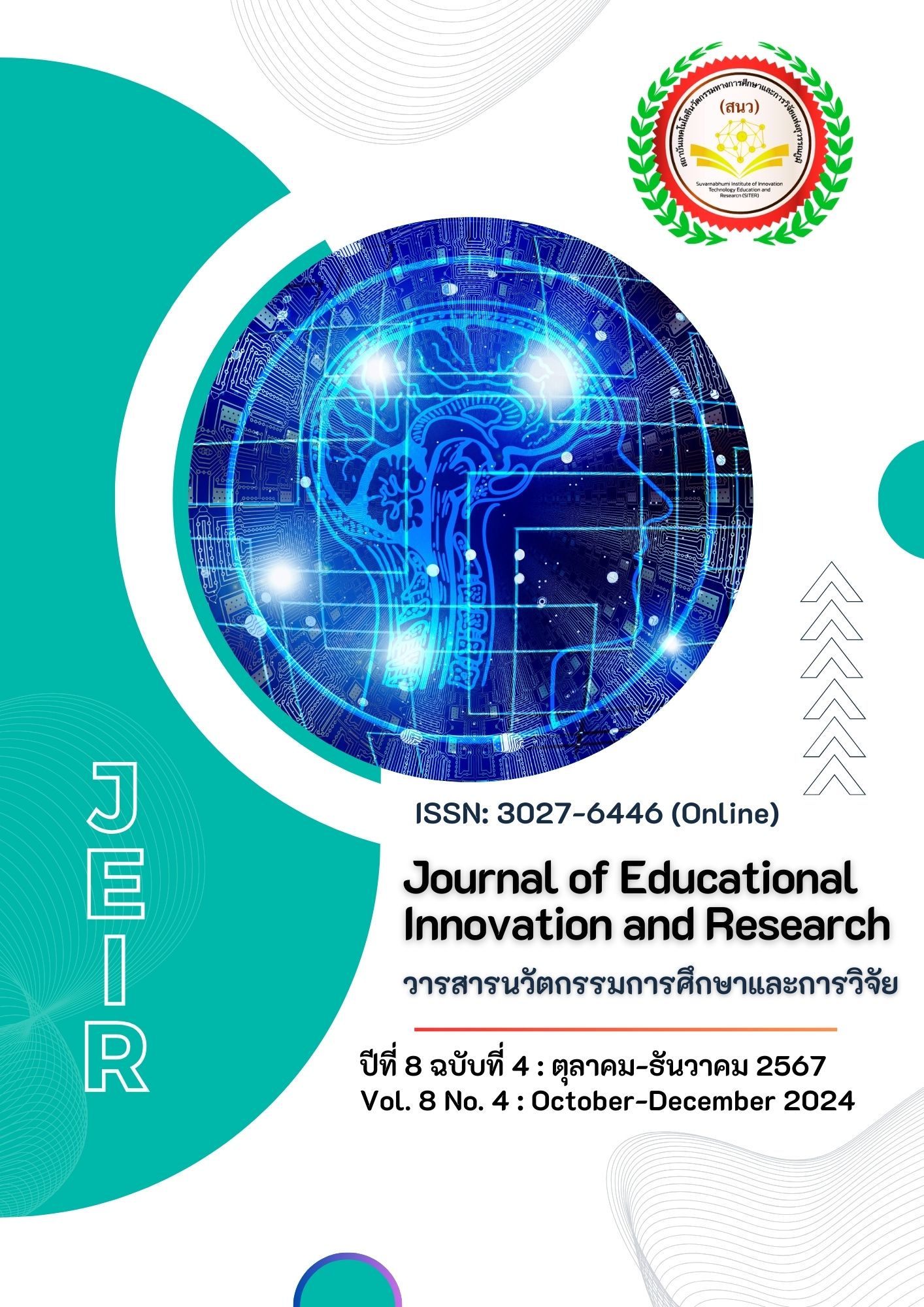การจัดการเพื่อความสำเร็จของโครงการเมืองอัจฉริยะในประเทศไทย
Main Article Content
บทคัดย่อ
การวิจัยครั้งนี้มีวัตถุประสงค์เพื่อ 1) ศึกษาสภาพปัจจุบัน และปัญหาของโครงการเมืองอัจฉริยะในประเทศไทย 2) เปรียบเทียบระดับการเป็นเมืองอัจฉริยะในประเทศไทยโดยจำแนกตามคุณลักษณะขององค์กรปกครองส่วนท้องถิ่น 3) ศึกษาการจัดการเมืองอัจฉริยะที่ส่งผลต่อระดับการเป็นเมืองอัจฉริยะในประเทศไทย และ 4) เสนอแนวทางการจัดการเมืองอัจฉริยะเพื่อความสำเร็จของโครงการเมืองอัจฉริยะในประเทศไทย โดยใช้การวิจัยเชิงสำรวจแบบผสมผสานในเชิงคุณภาพ และเชิงปริมาณ ใช้การสัมภาษณ์เชิงลึกจากผู้เชี่ยวชาญ จำนวน 20 คน และใช้แบบสอบถามเก็บรวบรวมข้อมูลจากผู้แทนระดับผู้บริหารระดับสูงขององค์กรปกครองส่วนท้องถิ่น จำนวน 400 แห่ง วิเคราะห์ข้อมูลโดยการวิเคราะห์เนื้อหา สถิติที่ใช้วิเคราะห์ข้อมูล ได้แก่ ค่าความถี่ ค่าเฉลี่ยร้อยละ ค่าส่วนเบี่ยงเบนมาตรฐาน วิเคราะห์ความแปรปรวนทางเดียว และวิเคราะห์การถดถอยพหุคุณเชิงพหุ
ผลการวิจัยพบว่า 1) โครงการเมืองอัจฉริยะเป็นนโยบายสำคัญของประเทศที่ยังไม่สามารถดำเนินการได้ครอบคลุมทุกพื้นที่ มีการดำเนินงานที่ซ้ำซ้อนทั้งการจัดเก็บข้อมูลและการบริหารข้อมูลเมือง เนื่องจากขาดที่ปรึกษาเฉพาะทาง อีกทั้งยังขาดบุคลากรที่มีความสามารถในการใช้เทคโนโลยีเข้ามามีส่วนร่วมเพื่อให้ผ่านการรับรองให้เป็นเมืองอัจฉริยะในประเทศไทย 2) ระดับการปฏิบัติเกี่ยวกับการจัดการเมืองอัจฉริยะ และระดับการเป็นเมืองอัจฉริยะในประเทศไทย มีระดับการปฏิบัติในระดับน้อย และคุณลักษณะขององค์กรปกครองส่วนท้องถิ่นแตกต่างกันมีระดับการเป็นเมืองอัจฉริยะในประเทศไทยแตกต่างกันอย่างมีนัยสำคัญทางสถิติที่ระดับ .01 3) การจัดการเมืองอัจฉริยะที่ส่งผลต่อระดับการเป็นเมืองอัจฉริยะในประเทศไทย ได้แก่ การให้คำปรึกษา การจัดการงบประมาณ การรายงาน การวางแผน การควบคุมสั่งการ และการจัดการบุคลากร และ 4) แนวทางการจัดการเพื่อความสำเร็จของโครงการเมืองอัจฉริยะ ได้แก่ 1) สำนักงานส่งเสริมเศรษฐกิจดิจิทัลออกข้อกำหนดให้ทุกพื้นที่ต้องดำเนินการให้เป็นเมืองอัจฉริยะ 2) องค์กรปกครองส่วนท้องถิ่นแต่งตั้งที่ปรึกษาเพื่อดำเนินการให้เป็นเมืองอัจฉริยะตามแนวนโยบายของสำนักงานส่งเสริมเศรษฐกิจดิจิทัล 3) สำนักงานส่งเสริมเศรษฐกิจดิจิทัลกำหนดให้องค์กรปกครองส่วนท้องถิ่นทุกแห่งต้องจัดทำแผนแม่บทโครงการเมืองอัจฉริยะแบบระยะยาว และ 4) สำนักงานส่งเสริมเศรษฐกิจดิจิทัลจัดตั้งคณะทำงานเพื่อปรับโครงสร้างการบริหารงานร่วมกันกับผู้มีส่วนได้ส่วนเสีย ให้สอดคล้องกับโครงการเมืองอัจฉริยะในระดับสากล
Article Details

อนุญาตภายใต้เงื่อนไข Creative Commons Attribution-NonCommercial-NoDerivatives 4.0 International License.
เอกสารอ้างอิง
จรูญ เจริญเนตรกุล. (2564). การพัฒนาศักยภาพพื้นที่เมืองและโครงสร้างพื้นฐาน รองรับยุทธศาสตร์เมืองอัจฉริยะของเทศบาลนครสงขลา [รายงานวิจัย, มหาวิทยาลัยเทคโนโลยีราชมงคลศรีวิชัย].
พิเชฐ สุขเพสน์ (2563). ปัจจัยที่มีผลต่อการพัฒนาเมืองร้อยเอ็ด [วิทยานิพนธ์รัฐประศาสตรมหาบัณฑิต, มหาวิทยาลัยราชภัฏมหาสารคาม].
สถาบันพระปกเกล้า. (2563). รายงานสถานการณ์การกระจายอำนาจ. สถาบันพระปกเกล้า.
สำนักงานเมืองอัจฉริยะประเทศไทย. (2562). คู่มือการจัดทำแผนพัฒนาเมืองอัจฉริยะ. https://www.depa.or.th/th/digitalservice/smartcity/thailand%20smart%20city%20unit
สำนักงานเมืองอัจฉริยะประเทศไทย. (2564). การส่งเสริมเมืองอัจฉริยะ. https://www.depa.or.th/ th/smart-city-plan/smart-city-office
สำนักงานส่งเสริมเศรษฐกิจดิจิทัล. (2564). การส่งเสริมเมืองอัจฉริยะ. https://www.depa.or.th/th/smart-city-plan/smart-city-office
อัครเดช พรหมกัลป์; และคณะ (2563). การพัฒนาความรู้และองค์ประกอบชุมชนสร้างสรรค์ Smart Community ของชุมชนในสังคมไทย [รายงานวิจัย, มหาวิทยาลัยมหาจุฬาลงกรณ์ราชวิทยาลัย].
Afari, P. A.; et al. (2021). Modeling the smartness or smart development levels of developing countries cities. Journal of Urban Management, 10(4), 369-381.
Allam, Z. (2020). Urban Governance and Smart City Planning: Lessons from Singapore. Emerald Publishing Limited.
Calzada, L. (2020. October 23). Smart City Citizenship. University of Oxford.
Gulick, L. & Urwick, L. (2003). The Early Sociology of Management and Organzation. Paper on the Science of Administration.
Kanagachidambaresan, G. R. (2020, July 15). Role of Edge Analytics in Sustainable Smart City Development: Challenges and Solutions. Publishing LLC.
Kim, S. C., et al. (2022). Determining Strategic Priorities for Smart City Development: Case Studies of South Korean and International Smart Cities. Sustainability Journals, 14(16), 10001.
Krejcie, R. V. & Morgan, D. W. (1970). Determination sample size for research activities. Education and Psychology Measurement, 30(3), 607–610.
Zhu, J., et al. (2024). How different can smart cities be? A typology of smart cities in China. Journal of Cities, 149, 104992. https://doi.org/10.1016/j.cities.2024.104992


